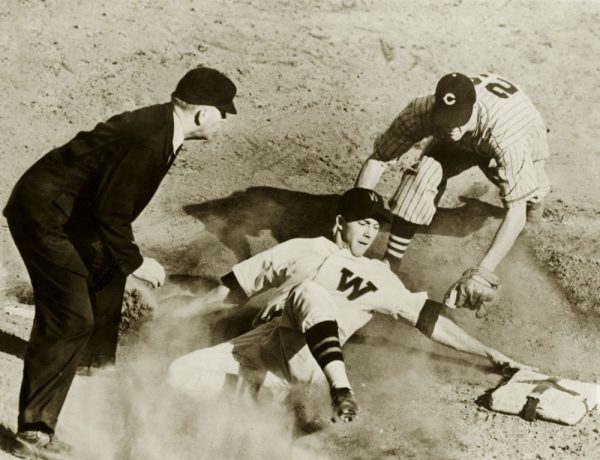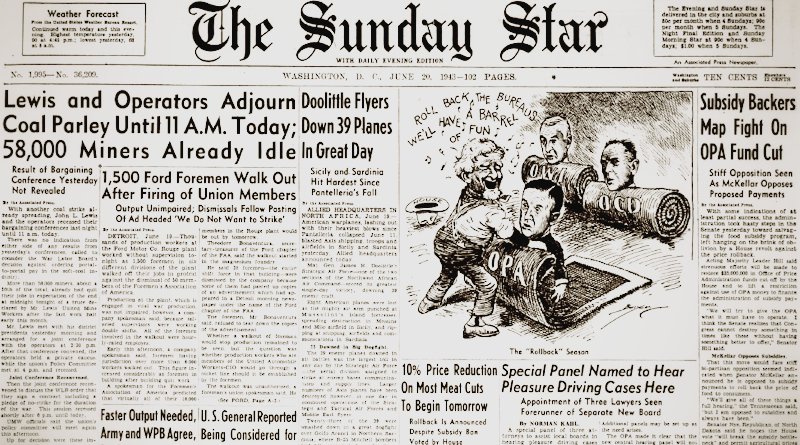World War II Chronicle: June 20, 1943
Click here for TODAY’S NEWSPAPER
Yesterday we wrote about the Coast Guard cutter Escanaba, which went down with all but two men in the North Atlantic. Page four has a first-hand account from the sailor. It is hard to wrap your mind around what it must be like when everyone you have served with for months — if not years — suddenly died. And miraculously you survived… Pictured on page 11 is the Vultee Vengeance dive bomber. If you haven’t heard of this aircraft that’s likely because it flew for British Commonwealth air forces…
A story on page 17 is already talking about post-war infrastructure projects. Is this an attempt at keeping American morale up since victory is a long way away? The Japanese were dealt crippling blows at Midway and Guadalcanal. The tide of the U-boat battle in the Atlantic seems to have turned. North Africa proved that we can whip the Germans. American fighter pilots are hammering their Axis counterparts while our factories are pumping out vast fleets of constantly improving ships and planes. On paper, things look great for the United States.
But our successes came at the high-water mark for the Germans and Japanese. Their supply and communication lines stretched across thousands of miles while ours are the shortest they will be. As enemy lines contract, their forces concentrate, the fighting will be more and more intense. Yes, the industrial capacity of our enemies can’t match ours. But they can make this war so costly that it breaks the will of the American people. At this point, most American family has someone who has been killed or wounded, or at least know a lot of people who have. How many hundreds of thousands — or perhaps millions — of American casualties are we willing to accept in a war that we didn’t start and stand to gain nothing from? Perhaps they can break our resolve and force a negotiated peace. Sure, Roosevelt and Churchill expect nothing short of unconditional surrender. But while chances for a German or Japanese victory look slim right now, a few crippling defeats can change that…
Page 18 discusses the Army and Navy working together to hone the ability to successfully force an amphibious landing on defended shores… George Fielding Eliot column on page 23… A recent newspaper (I don’t remember which) carried a column assuring that the United States would not become the world’s police force once the war is over. Today, Senator Joseph H. Ball suggests a “United Nations” that would act as a “world police force” (see page 25). Senator Ball will later sponsor a bill establishing the UN…
Sports section starts on page 26, which announces that the NFL has approved the merger between the Pittsburgh Steelers and the Philadelphia Eagles. A potential merger between the two Chicago clubs was denied… George Washington Case — baseball’s fastest man — is pictured stealing home on the bottom of the page. Case has led the majors in steals every year since 1939. “He’s fast,” says Chicago White Sox manager Jimmy Dykes. “When he’s asleep they tell me he’s fast asleep.” The only man Case ever loses to in his many races is Jesse Owens. After the war, the former Olympic gold medalist beats him by half a stride in a race across Cleveland’s outfield. But that was after numerous injuries and Case was about to retire from baseball…

An interview with Lt. Gen. Leslie McNair, chief of the Army’s ground forces, is on page 34… War’s 198th week is summarized on page 36… What would a 2,000-lb. bomb do to downtown Washington, D.C.? See page 37… Advertisement for Wheaties — the “Breakfast of Champions” — on page 75… Page 81 tells of Victor Romano, an Army phone operator that flew with the Royal Canadian Air Force gunner who shot down 11 Germans before becoming a U.S. Army private.
Evening star. (Washington, D.C.), 20 June 1943. Chronicling America: Historic American Newspapers. Lib. of Congress.
https://chroniclingamerica.loc.gov/lccn/sn83045462/1943-06-20/ed-1/
